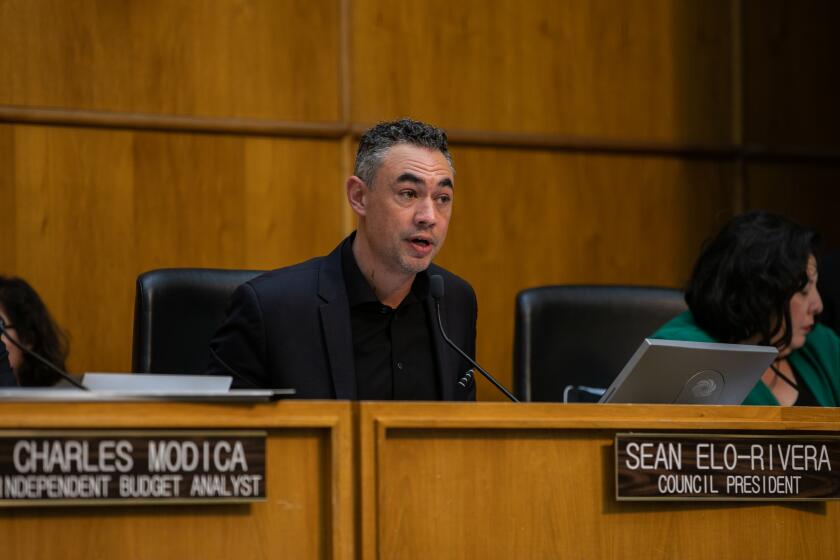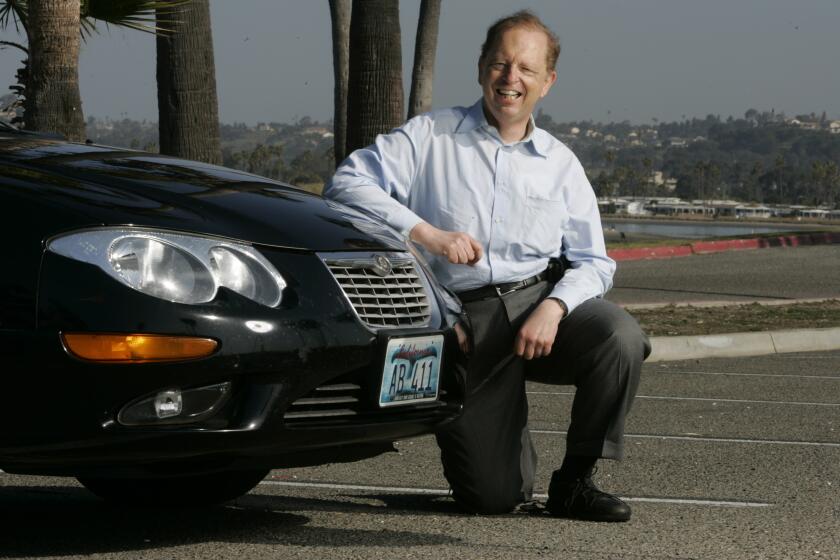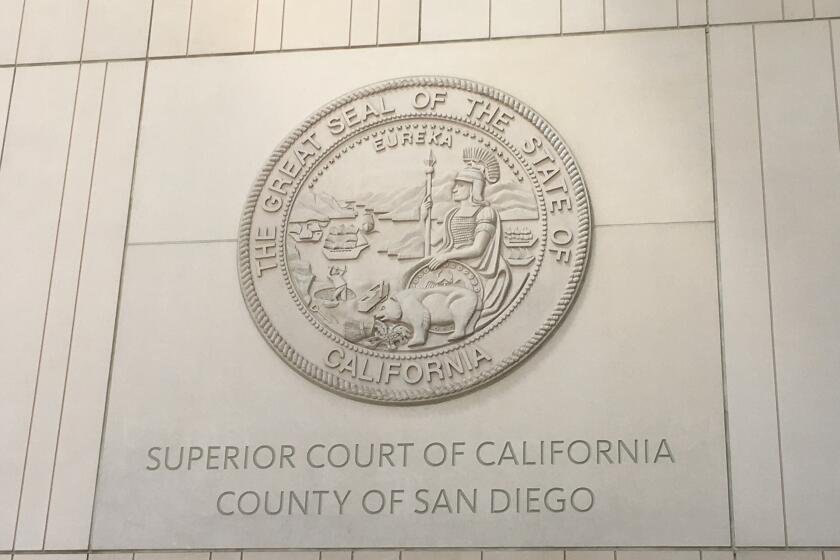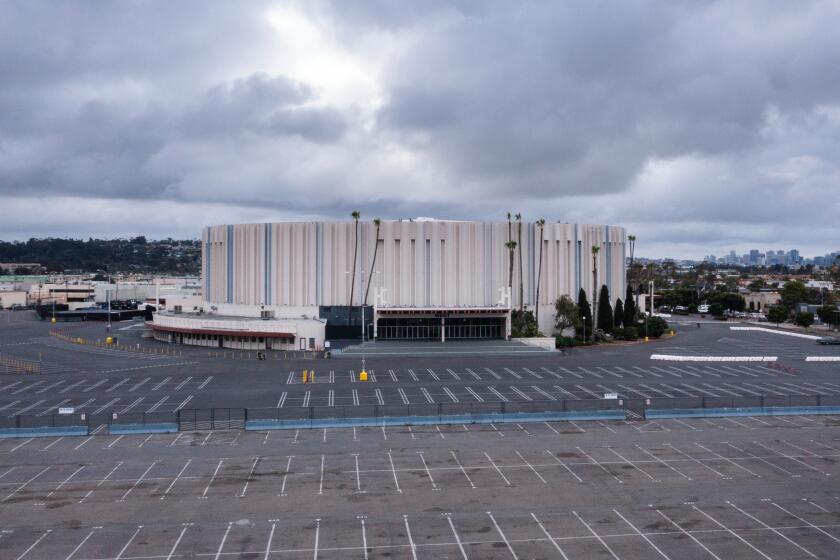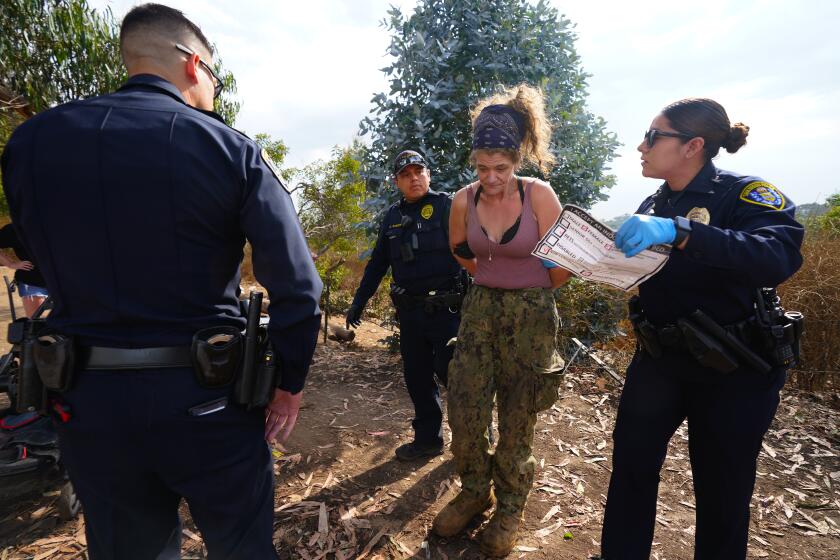Homeless people with disabilities sue San Diego over RV parking law
A group of disabled homeless people filed a federal lawsuit on Thursday against San Diego, challenging its enforcement of laws that prevent homeless people from living and sleeping in recreational vehicles.
The nine homeless men and women say they have no choice but to live in their RVs and park them overnight on city streets. They say their disabilities make them unable to afford rent and that homeless shelters are unsuitable for the disabled.
Their lawsuit, which was written by attorneys from the Sacramento-based nonprofit group Disability Rights California, demands that the city immediately stop citing disabled people under its long-standing vehicle habitation ordinance and its relatively new RV ordinance.
The RV ordinance, enacted by the city in 2014, prohibits such vehicles from parking on any San Diego city street or in any public parking lot between 2 a.m. and 6 a.m.
Gerry Braun, a spokesman for City Attorney Mara Elliott, said city officials will review the lawsuit but declined further comment.
Attorneys for Disability Rights California say city officials expressed interest last spring in making changes when presented with the group’s complaints, but that nothing ever came of those discussions.
Three “safe” parking lots recently established in San Diego allow overnight parking for homeless individuals, but they don’t accept RVs and have far fewer spaces — 150 — than the estimated 1,000 homeless people living in vehicles locally, the lawsuit says.
Those lots also require users to apply for slots in local homeless shelters, a move that doesn’t make sense for most disabled homeless people living in RVs because shelters aren’t appropriate environments for them, the suit says.
People who are physically disabled may struggle with stairs in shelters and those with mental health problems don’t function well in noisy, dirty, unsafe and overcrowded conditions where there is a lack of privacy, the suit says.
The nonprofit group that operates the safe lots, Dreams for Change, doesn’t allow RVs because they take up more space than cars and because people living in cars typically face greater urgency to find permanent housing, chief executive Teresa Smith said by telephone on Thursday.
The lawsuit says the RV law and vehicle habitation ordinance both violate numerous U.S. and state constitutional rights, including the Eighth Amendment prohibition on cruel and unusual punishment and the 14th Amendment due process protections.
Enforcement of the two laws also violates the antidiscrimination protections of Title II of the Americans with Disabilities Act of 1990, the suit says.
“Their vehicles are their only reliable, safe shelter from the elements and only place to store their belongings,” the suit says. “Yet, even though there are no adequate alternatives, the city has repeatedly ticketed and harassed these individuals for seeking shelter in their vehicles or simply for owning vehicles and having nowhere else to park.”
The names of the nine plaintiffs are Michael Bloom, Stephen Chatzky, Valerie Grischy, Penny Helms, Doug Higgins, Suzonne Keith, David Wilson, Tony Diaz and Benjamin Hernandez.
They range in age from 54 to 70 and each contends they can’t afford San Diego’s high rents because they have a disability preventing them from earning enough money.
Disabled people receive a monthly check from the government of about $900 because they aren’t capable of working. San Diego’s average rent is just over $1,800 for a two-bedroom apartment.
Monthly fees at RV parks, another option, range from $700 to $1,650.
The goal of the RV law was boosting safety, aesthetics and parking availability — particularly near the beach — by preventing tourists with large campers from sleeping inside their vehicles to avoid paying for hotels or other accommodations.
Many city residents had become frustrated with the RVs and what came with them, including trash on the street, loitering outside their campers and other problems that turned some neighborhoods into makeshift campgrounds.
An unintended consequence may have been increasing homelessness by forcing onto the streets some people who had been sleeping in RVs.
david.garrick@sduniontribune.com (619) 269-8906 Twitter:@UTDavidGarrick
Get Essential San Diego, weekday mornings
Get top headlines from the Union-Tribune in your inbox weekday mornings, including top news, local, sports, business, entertainment and opinion.
You may occasionally receive promotional content from the San Diego Union-Tribune.




